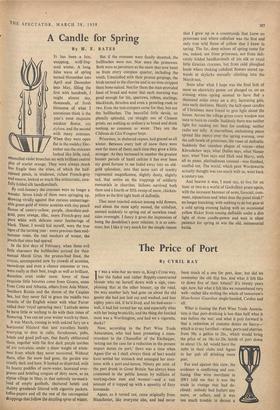The Price of Port
By CYRIL RAY
T was a wine-bar we were in, King's Cross way, I but the faded and rather floppily-constructed blonde who sat herself down with a sigh, com- plaining that at the other boozer, up the road, the way another lady had gone on about the old geezer she had just laid out and washed, and him eighty years old, if he'd lived, and his bed-sores- well, it had fair turned her up, and especially what with her being bronickle, and the thing she fancied most was a Worthington, and had we a cigarette, ducks?
Now, according to the Port Wine Trade Association, who had been presenting a mem- orandum to the Chancellor of the Exchequer, `setting out the case for a reduction in the present import duties On port,' there was a time when Agnes (for so I shall always think of her) would have settled her stomach and assuaged her emo- tions with a port-and-lemon. Ninety per cent. of the port drunk in Great Britain 'has always been consumed in the public houses by millions of working-class men and women'—and a vast amount of it topped up with a quantity of fizzy lemonade.
Agnes, as it turned out, came originally from Manchester, like everyone else, and had never been much of a one for port, dear, but did we remember the old Slip Inn, and what it felt like to down five of their bitters? It's twenty years ago, now, but what it felt like we remembered very well—rather like writing the whole of tomorrow's Manchester Guardian single-handed, Cardus and all.
What is fussing the Port Wine Trade Associa- tion is that port-drinking is less than half what it was before the war, and what it puts forward is that a reduction of customs duties on heavy— which is to say fortified—wines, ports and sherries, from 50s. a gallon to 26s., which would bring the pike of an 18s.-to-20s. bottle of port down to about 13s. 6d. would have the nobs in their clubs and Agnes in her pub all drinking more port.
For and against this view, the evidence is conflicting and con- fusing. One wine merchant in SW1 told me that it was the trade in vintage that had de- clined: nobody had butlers any more, or cellars, and it was too much trouble to decant a crusted vintage pert when there was the washing- up still to do. On the other hand, I have seen in the sale room, and recently, the trade paying any- thing from 360s. to 470s. a dozen for the great 1927s and 1935s-30s. to 40s. a bottle, and hoping to make a profit. Which makes nonsense of what I was told in a club, where a man on the wine com- mittee said that they had more, port than they knew what to do with, habits having changed so much. 'Send half to the sale room,' I suggested, 'and buy claret: `But if nobody's drinking port any more,' he said, 'and nobody here is, who'd buy it in the sale room?'
The director of a firm that ships wines and owns its own wine-bars said, on the other hand, that vintage port was all right, and that what worried him was that too many of the port-and-lemon drinkers who had survived the war had taken to gin, or to one-and-threepenny Babycham—which is a sparkling English-made perry drink in tiny bottles that will each fill a champagne glass—with a brandy in it if you felt flush. A significant side- light on the port trade's memorandum is that although the duty on port and sherry is the same for both, sherry sales are as high as they were in 1938: 'better propaganda,' said my friend in the trade: 'they've convinced you that you can drink sherry before, during, and after the meal, and smoke while you're drinking it. There's always been too much fusS about port.'
Much of that old reverence, though, has gone —the attitude towards port that prompted a friend of mine, a don, to suggest Ruby and .Tawny as names for his new twins, girl and boy, till his wife asked him if he felt like going down in university history himself as Old Crusted.
Perhaps the final answer was that given by an elderly acquaintatice of mine who told me, in his club's morning-room, that although he dearly loved port, he never seemed to have a meal these days that was worth having port after. Which reminds me that Agnes, getting steadily more melancholy, began to lament a tripe-shop in Man- chester destroyed in the blitz. I think that if it had survived, and was licensed, and was now serving portions of seam and honeycomb the size of double-bed blankets, Agnes still wouldn't have been weaned away from gin-and-It first, stout with, and a gin-and-pep to follow. I seem to recall that in Manchester in those days port:and-lemon was regarded as a bit common, and what Man- chester thinks today . . .











































 Previous page
Previous page